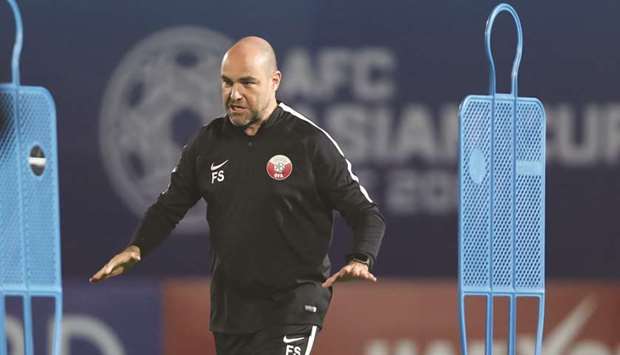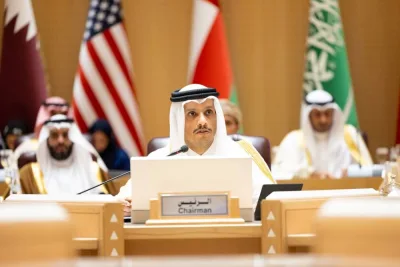Qatar coach Felix Sanchez leads his side into the Asian Cup against Lebanon tomorrow with their politically-charged appearance in the United Arab Emirates another test en route to 2022.
In three years and 10 months the World Cup will begin in Qatar. Only South Africa, in 2010, have been eliminated as World Cup hosts before the knock-out stage and Qatar intend to avoid that fate.
“It’s a very important year for us as we are competing in the Asian Cup as well as the Copa America,” Hassan
al-Haydos said.
“Then we have the World Cup coming up in four years. These tournaments are part of our preparations for the FIFA World Cup.”
Qatar have been only a modest regional power with quarter-final appearances in 2000 and 2011 their best showings at the Asian Cup.
They were eliminated with three losses out of three four years ago in Australia.
But under boss Felix Sanchez, in charge since July 2017, things have improved considerably. A win over Switzerland and draw with Iceland, albeit in friendlies, were noteworthy results achieved as the money pumped into Doha’s Aspire academy finally seems to be paying dividend.
Crucially Sanchez has plenty of experience with the players, having worked at Aspire for seven years from 2006 before coaching the under-19, U20 and U23s before taking the senior post.
Striker Akram Afif — scorer of the winner against the Swiss — joined Spanish side Villarreal, although he is currently back on loan at Al Sadd, while defender Abdulkarim Hassan was Asian player of the year in 2018.
“Every team goes into any competition eyeing the title,” said Sanchez. “The Qatari team’s goal is no different.
“I know Qatari fans have big hopes from the current batch of players and I hope we can deliver.
Having said that we are in a tough group, and all the teams deserve the respect.”
Favourites in Group E will be Saudi Arabia, looking to bounce back from a poor World Cup, while North Korea will also feel capable of reaching the knock-outs.
The meeting with Saudi Arabia, on January 17 in Abu Dhabi, will be eagerly anticipated around the world with onlookers anxious to see how the teams react given the political situation between the countries.
FIFA president Gianni Infantino, who attended the tournament opening game on Saturday, backs a sudden expansion of the 2022 World Cup from 32 to 48 teams — an idea viable only by using Qatar’s neighbours as co-hosts.
“There are tensions in this particular region and it’s up to their respective leaders to deal with that but maybe it’s easier to talk about a joint football project than more complicated things,” Infantino said at a recent conference in Dubai.
“If it can help all the people in the Gulf and all the countries in the world develop football and bring a positive message to the world about football, then you should give it a try.”
Whether Infantino gets his expansion wish early — the increase will definitely happen at the 2026 edition — or not is of little real concern to them.
“If we see that it’s in the benefit of football, the World Cup itself, and we feel like it’s going to add, we would be all for it,”
Nasser al-Khater, assistant secretary-general of the Supreme Committee for Delivery and Legacy, said last year.
“If we feel that it’s not in favour of us or of football, we won’t go for it.”
In 2022 the football world will turn to Qatar whatever happens.
And their team may even be competitive to boot.

Qatar coach Felix Sanchez during a team training session in Abu Dhabi yesterday.


